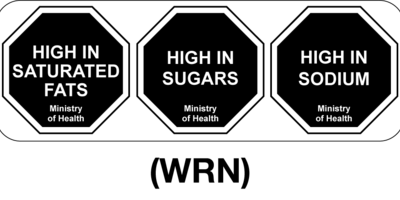
Bridgetown, Barbados, 18 April, 2023 (PAHO/WHO) - According to a recently published study, the Octagonal Warning Label System for food and drink products is the most effective to help Jamaican consumers to make healthier choices.
The study is titled: “Effects on front-of-package nutrition labelling systems on understanding and purchase intention in Jamaica: Results from a multiarm randomized controlled trial”. The study showed that these labels assisted Jamaicans best in correctly identifying the least harmful option and the presence of excessive amounts of critical nutrients. Using this system, participants also performed best in choosing the least harmful product more often. A randomized control trial is the gold standard to measure effectiveness.
Octagonal Warning Labels is the system included in the Caribbean Community Regional Organization for Standards and Quality (CROSQ) proposal to be adopted by CARICOM Member States. It has been developed to indicate when food and drink products are high in sodium/salt, sugar, fats, saturated fats and trans fats. CARICOM members states, have since 2018, engaged in a process to adopt front-of-package warning labels to be applied using WHO/PAHO thresholds for excessive fats, sugars and sodium. The process has been delayed, and new voting is expected to be completed before the end of 2023.
According to one of the study researchers, Dr. Fabio Gomes, “The prevalence of overweight, obesity and noncommunicable diseases (NCDs) continues to increase in the Americas, among all age groups. They are the major cause of disability and premature death in Latin American and the Caribbean. This region has the highest prevalence of obesity in the world. The prevalence of overweight and obesity in adults is 64.1% among men and 60.9% among women. The study concluded that the Octagonal Warning labeling is the best performing system within any adult population age group, gender group, education group and those who suffer from an NCD and related risk factors groups. Octagonal warnings were the easiest to understand and use by Jamaican consumers choosing food and drink products in nine parishes throughout the country.”
The other systems analyzed were the magnifying glass (MGG) and the traffic-light (TFL). The study found these systems to be inefficacious in increasing the ability of persons to correctly identify the least harmful products.
These findings contribute to the growing body of evidence showing that warning labels outperform other systems in improving understanding and encouraging consumers to make healthier food choices. Other studies have demonstrated warning labels are easier to understand and quicker to find on the labels due to their simplicity and higher prominence. Given their simplicity, Octagonal Warning labels also do not require consumers to receive prior training or education to understand the messages.
“The study conducted in Jamaica confirms that given that supermarkets are filled with thousands of packaged items and shoppers spend only a few seconds selecting an item, little time to determine whether a product harms their diet, their blood pressure, sugar levels and/or weight control,” Fabio Gomes explained.
Dean Chambliss, Director of the PAHO Subregional Program for the Caribbean, pointed out that the study contributes to the body of robust scientific evidence accumulated in other countries of the Americas that supports the octagonal warning labels as the best policy option to protect heathy diets and public health.
“The study confirms that without providing any prior information or training to consumers, octagonal warning labels can effectively improve their ability to make healthier decisions, even if persons have lower levels of education. That is why warning labels are essential to ease making the healthy choice, particularly in countries where the burden of unhealthy eating continues to drive societies’ inequities and related pandemics,” Mr Chambliss noted.
The study was conceived, designed and conducted by the Ministry of Health and Wellness of Jamaica, the University of Technology, Jamaica, and PAHO.
Read the study: https://bmjopen.bmj.com/content/13/4/e065620
Now More than Ever Campaign: https://www.paho.org/en/campaigns/now-more-ever-caribbean-campaign-promoting-front-package-warning-labelling




